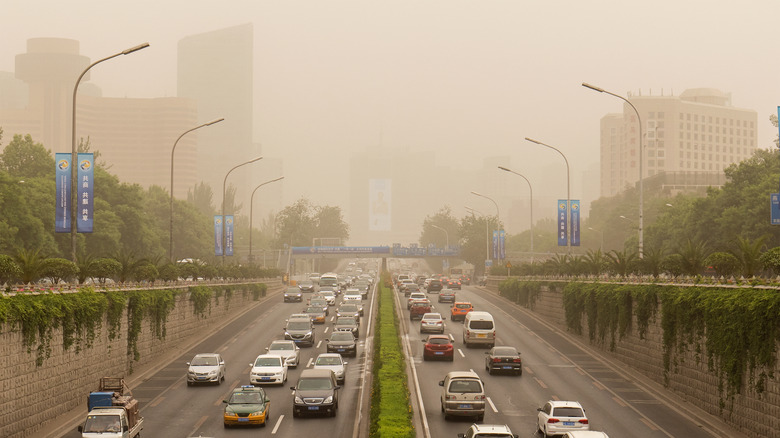What Air Quality Warnings Really Mean
Air quality alerts warn the public about rising air pollution levels and unhealthy air quality in the area. Poor air quality is caused by five major pollutants: ozone, particulate matter, carbon monoxide, nitrogen dioxide, and sulfur dioxide (via Cleveland Clinic). These pollutants are regulated by the Clean Air Act and monitored by the Air Quality Index, which measures and calculates the air quality of a given region on a scale of 0 to 500, with 0 meaning good and 500 meaning hazardous.
Although air pollution isn't healthy for anyone, air quality alerts are especially important for people belonging to sensitive groups, like children, older adults, and people with respiratory or cardiovascular conditions. For example, poor air quality can be particularly harmful to people with allergies, asthma, emphysema, chronic bronchitis, chronic obstructive pulmonary disease, and arrhythmia.
Poor air quality caused by particulate matter is also associated with an increased risk of heart attacks and strokes. "Even though you're inhaling the air, it doesn't just impact your lungs," pulmonologist Dr. Sumita Khatri told the Cleveland Clinic. "Pollution can increase inflammation all over the body, and inflammation plays a role in all kinds of illnesses."
How to protect yourself from unhealthy air quality
The best way to protect yourself from unhealthy air quality is to stay inside. Staying indoors can help shield you from any harmful pollutants that may be lingering in the air outside (via Treehugger). However, this is not always practical or even possible. That's why it's important to take precautions to help limit your exposure to any pollutants that may potentially wreak havoc on your health.
Experts at Treehugger provide a number of suggestions one can take to protect themselves. One way is to avoid doing any intense physical activity outdoors. Workouts or other activities that require you to exert yourself can increase the amount of breaths you take, causing you to unnecessarily breathe in more unhealthy air. Depending on how hazardous the air quality is, you may also want to wear a mask or even a respirator whenever you're outdoors. This will help filter out any particulate matter in the air outside. It's also important to stay hydrated. Drinking plenty of water and fluids can help your lungs function by lubricating your respiratory membranes. This can help flush out any pollutants and safeguard against inflammation.

